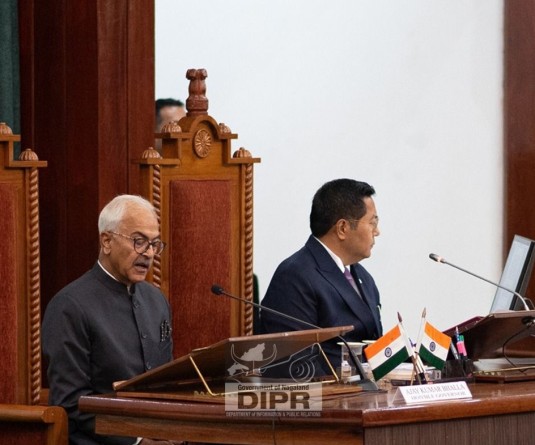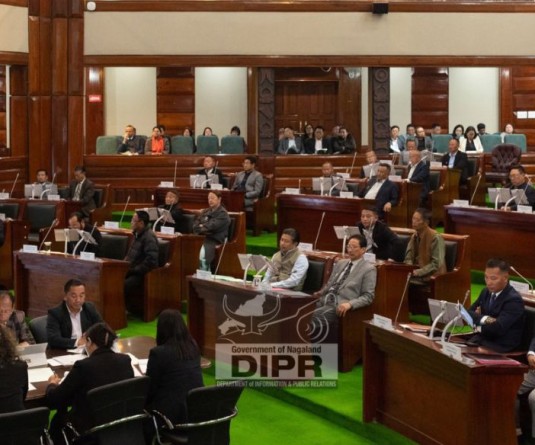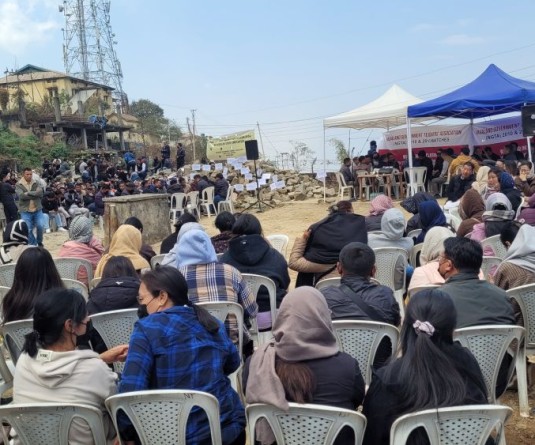
Longrangty Longchar
Dimapur | November 2
Nagaland Governor, Shyamal Datta today, while speaking as the Chief Guest at the second Regional conference on ‘Fostering Good Governance’ held at police complex at Chumukedima here, lamented that the people of north east have a feeling of isolation and alienation and that the area is characterized by political turmoil, low economic development and income. He said that “Look East Policy” of Government of India can only work when Eastern part of India can look North- East with trust and confidence.
He said that in the changing scenario of world business the Nagas too must try to catch up with others or else be left behind. He said that the state has abundant resources be it agricultural, mineral or human resources. However he lamented that there is lack of infrastructure and investment in the state which is leading to poor economic growth. He advised the people to invest in infrastructure.
The Governor also exhorted the people of north-east region to develop knowledge, skills and competence to effectively take part in global economy. He cited the examples of Gujarat, West Bengal and Orissa where developments are taking place at a very rapid pace now.
“The main task of the government is that of a facilitator, rather than that of controller and regulator”, Datta said and called upon the participants for change. He said that politics must take a backseat in the interest of economic growth. Stressing the need for economic development, the Governor said that economically sound policies should be given more importance.
Comparing governance in developed countries with that of India, the Governor said that in developed countries, good governance is not a factor, because they have nearly perfected the art of governance so that public policies are not held hostages to the whims and fancies of pressure groups and vested interests. The Governor also said that fine distinctions are drawn between state and government in the developed states, and nothing is done to undermine the governance.
The Governor also stressed that the need of the hour is the participation of men and women with dreams, rather than of memories, as people with dreams are futuristic and generate hopes around them, while people with ‘memories creates despair.’
Earlier in the programme, L K Joshi Secretary DOPT Government of India, in his keynote address, challenged the participants to let transparency, professionalism, accountability and impeccability to be the basis of governance saying that the role of the bureaucrats was shifting from that of a controller to facilitator and from provider to enabler.
Coming out hard against corruption, the Secretary said that the most disturbing element of governance is the overlapping and pervasive corrupt practices. He said that corruption undermines democracy and good governance by flouting or even subverting formal processes and also undermines the legitimacy of government and democratic values of trust and confidence. He warned that India is committed to its objective of zero tolerance against corruption.
The two-day conference is being attended by senior bureaucrats from ten states, academicians, political executives, NGOs and World Bank executives. The programme will end tomorrow with a discussion and summing up of the activities of the conference.
The discussion
The Deputy Chairman of the State Planning Board, Deo Nukhu, during the panel discussion, questioned whether the people of India really accept the principal of unity in diversity of race and culture in the country. He said that while traveling to different parts of the country, he found that ‘some Indians are very ignorant about their country.’ He said some people cannot accept the tribals and said that it was the crux of the problem facing the Nagas. He appealed the people to come together and accept each other. He also termed as ‘nonsense’ the government’s policy of giving large amount of money to others like the railway in Bihar while allocating negligible amount for the hills states.
Nagaland Home Minister Thenucho, another panelist, talked mostly from the political point of view and said that political conflicts need to be dealt with by a man of integrity and sensitivity. He alleged that most of the funds from the Centre go to the urban areas only and that was the reason why most of the rural areas remain underdeveloped. Good governance is not an academic topic, it is all about implementation, he said.
Mona Lisa Chankija, Editor of Nagaland Page raised some interesting points for the participants of the workshop to ponder upon. She asked whether bureaucrats knew the reason why they were selected, whether it was just a job or ‘a profession’ for them. She also asked why the Right to Information Act was not a fundamental right but just an Act.
Chankija also added that good governance must be accompanied by punishment to those practicing bad governance. She also questioned whether communitisation is abdicating the work of good governance.
State Chief Secretary, Lalhuma called upon the participants to make policies in consultation and said that good governance is for the delivery of the policies of the government. While K Savi, Advocate made some good remarks about consumer rights.
However, the irony is that, the panel discussion was hardly a discussion at all, as by the time the Moderator Amithabha Pande, Secretary ISCS Government of India, finished reading out his lengthy speech and by the time the panelist gave their remarks, it was already time for lunch break; and so the panel discussion abruptly ended there.






